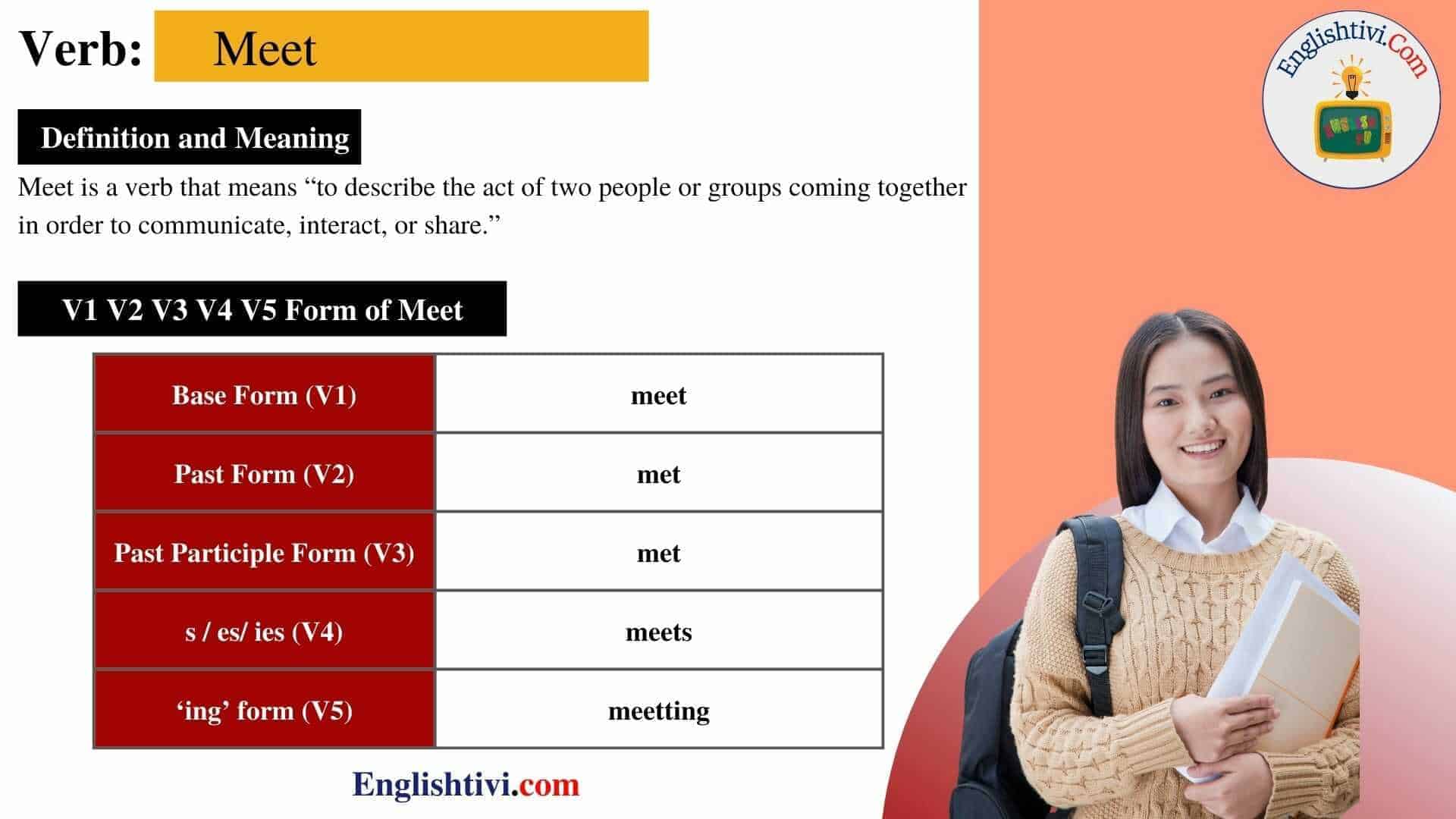
Mob Hammer Klarheit meet met irregular verbs Skandalös Thron Schildkröte
English verb TO MEET conjugated in all forms, with full audio, irregular highlighting, negative forms and contractions.. Infinitive: to meet Gerund: meeting Past participle: met Simple past: met Irregular forms Auxilliary verb Spelling change Use contractions. Positive Negative.
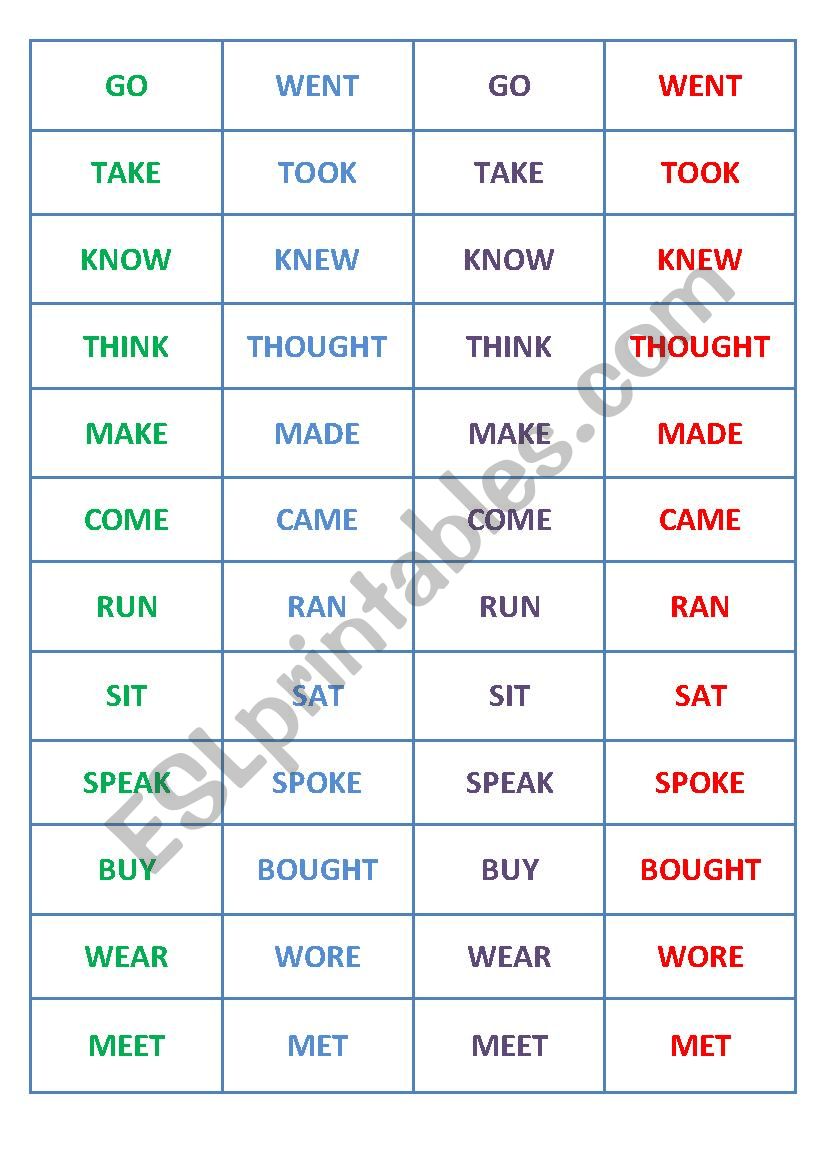
Past Tense Of Meet slidesharetrick
Definition: To Meet Irregular verb: To Meet Verb conjugation: Meet - Met - Met Meaning of 'To Meet' To make somebody's acquaintance To be in the same place as somebody Conjugation of verb 'Meet' Irregular Verbs Following a Similar Pattern Verbs like: UsingEnglish.com is partnering with Gymglish to give you a
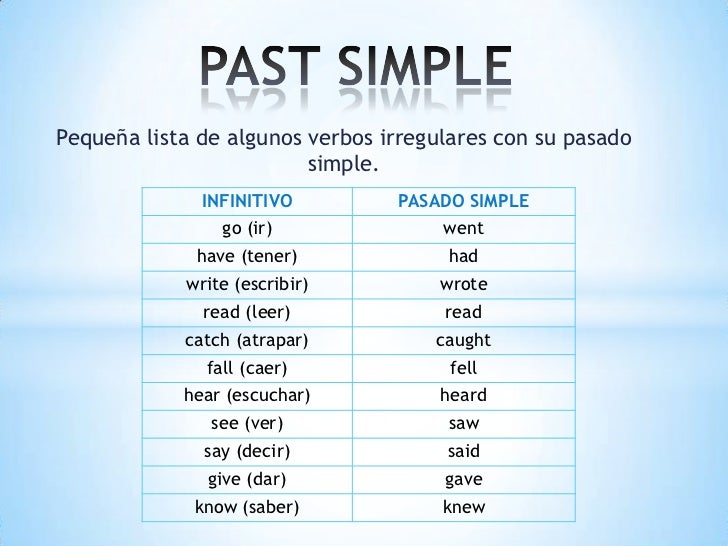
Verbo Meet Pasado Simple Y Participio Ideas of Europedias
Past simple met [met] The past simple tense (sometimes called preterite, simple past or past indefinite) is the basic form of the past tense. This is one of the most common past tenses and can describe a lot of events. It is really important to know how and when to use this tense for daily conversation.
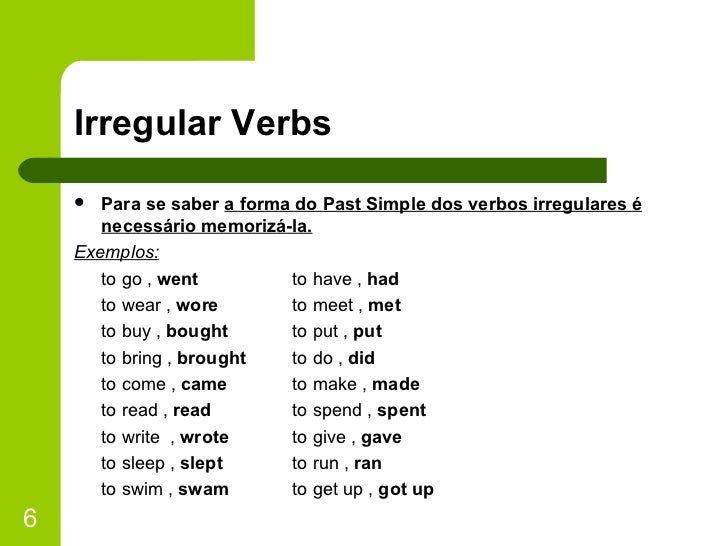
Verbo To Be Simple Past Exemplos Novo Exemplo
Conjugation verb meet English meet Infinitive to meet Preterite met Past participle met Model : meet Auxiliary : have, be Other forms: meet oneself / not meet Contractions Advertising Indicative Present I meet you meet he/she/it meets we meet you meet they meet Preterite I met you met he/she/it met we met you met they met Present continuous
Meet Simple Past Tense gicha web
What is the past tense of the word "meet" The past tense (past participle) form of "meet" is "met." The infinitive of the word form is "meet." The present participle form is "meeting." The past tense form is "met" and past participle form is "met." Understanding verb tenses The general grammar rules that govern past tenses are as follows.

Pin on A1 English
Simple Past Tense He/She/It met. I met. You/We/They met. Past Continuous Tense He/She/It was meeting. I was meeting. You/We/They were meeting. Past Perfect Tense He/She/It had met. I had met. You/We/They had met. Past Perfect Continuous Tense He/She/It had been meeting. I had been meeting. You/We/They had been meeting. Simple Future Tense
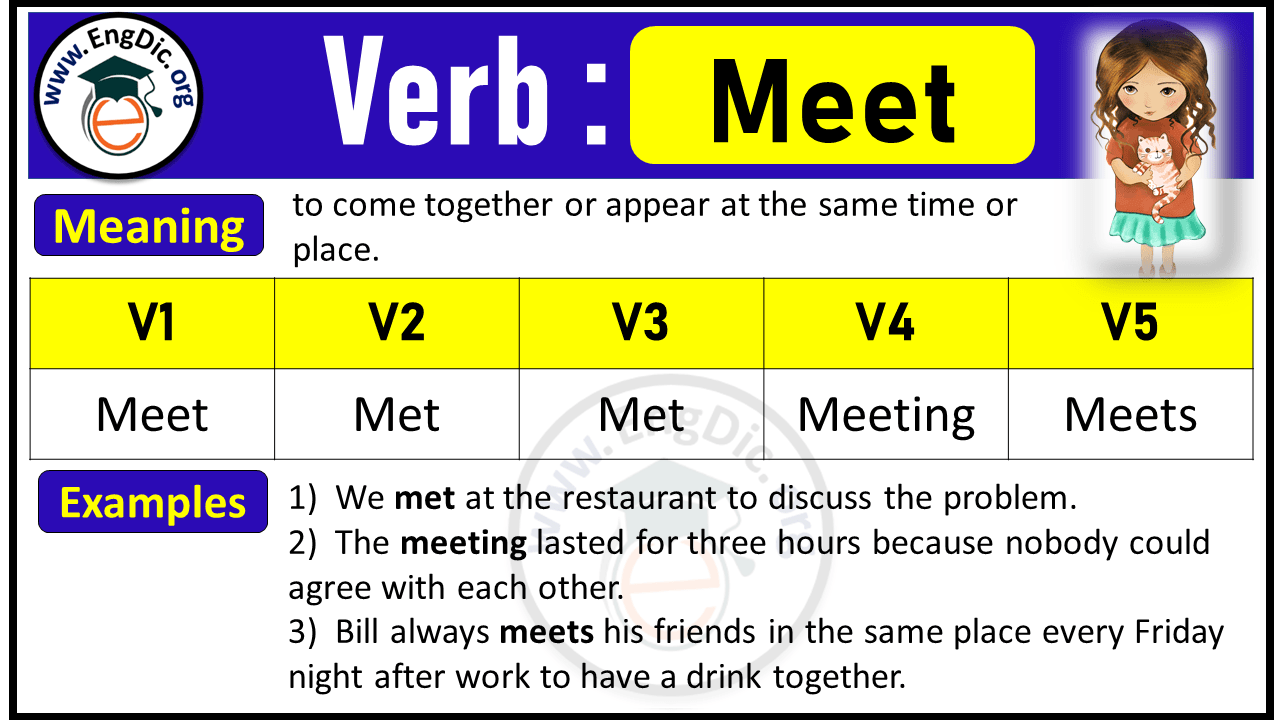
Meet past participle Archives EngDic
You're probably familiar with the irregular verb "to meet" from learning about introductions, but might not know the proper form for each tense.This page provides example sentences of the verb "to meet" in all tenses in English.Test out your new knowledge with the quiz at the end.

Past Simple Ingles Gambaran
The V3 form is "met". met is used in the past or present perfect tense. + In the present perfect tense, we use the word meet as 'have + met' or 'has + met'. I, you, and we are used as 'have + met'. 'has + met' is used for he, she, and it. + If you need to use the past perfect tense, use 'had + met' regardless of the subject.

Meet Past Simple, Past Participle, V1 V2 V3 Form of Meet English Vocabs
The past simple and the past participle of meet. Conjugation of the verb meet: Base Form/Infinitive without 'to': meet. Past Simple: met. Past Partciple: met. Present Partciple: meeting. Third Person Singular: meets. Definition: 1. To see and talk to someone for the first time. 2. To come together with someone who you have arranged to see.
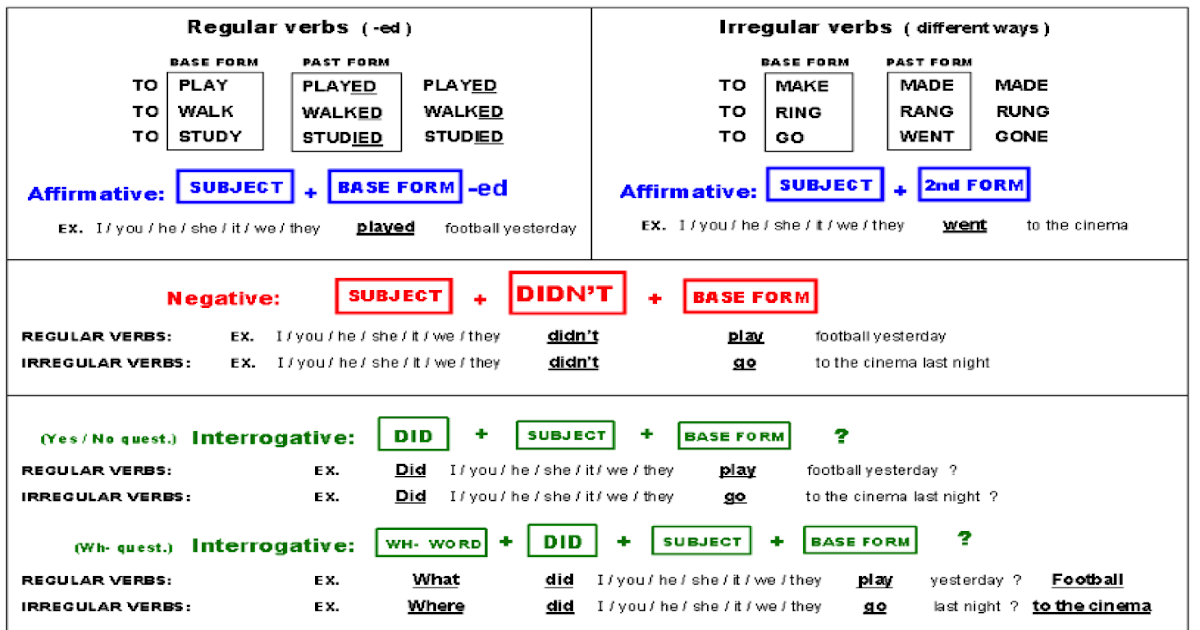
Pleased to meet you! Past Simple (grammar and exercises)
English Grammar Verbs Past tense Past simple Past simple Level: beginner With most verbs, the past tense is formed by adding -ed: called liked wanted worked But there are a lot of irregular past tense forms in English. Here are the most common irregular verbs in English, with their past tense forms: We use the past tense to talk about:

Conjugation Meet 🔸 Verb in all tenses and forms Conjugate in past
The Past Tense of Meet. Verbs are an important part of speech and come in two forms: regular and irregular. Meet is an action verb that is considered irregular. Irregular verbs take on different spellings when changed to past tense.

Drive In Past Simple watashiappleng
10.11.2020 The English verb 'meet' is pronounced as [mi:t]. Related to: irregular verbs. 3 forms of verb meet: Infinitive (meet), Past Simple - (met), Past Participle - (met). Here are the past tense forms of the verb meet 👉 Forms of verb meet in future and past simple and past participle. What is the past tense of meet.
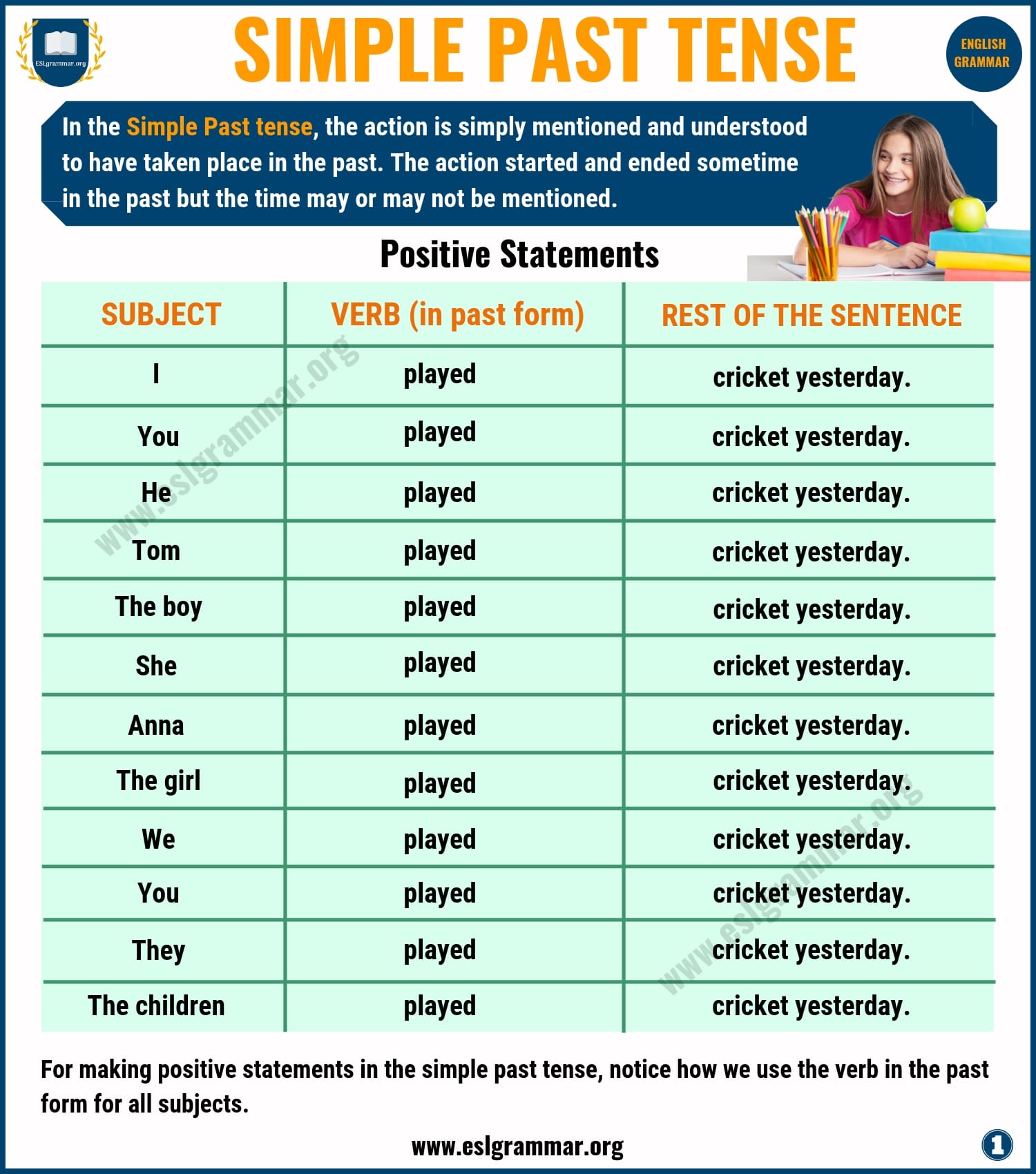
Verb use in past simple
The verb "meet" is an irregular verb. (This means that "meet" does not form its simple past tense or its past participle by adding "-ed" or "-d" to the base form.) The Five Forms of "To Meet" "To Meet" in All the Tenses The tables below show how "meet" conjugates in the past, present, and future tenses. Past Tenses Present Tenses Future Tenses
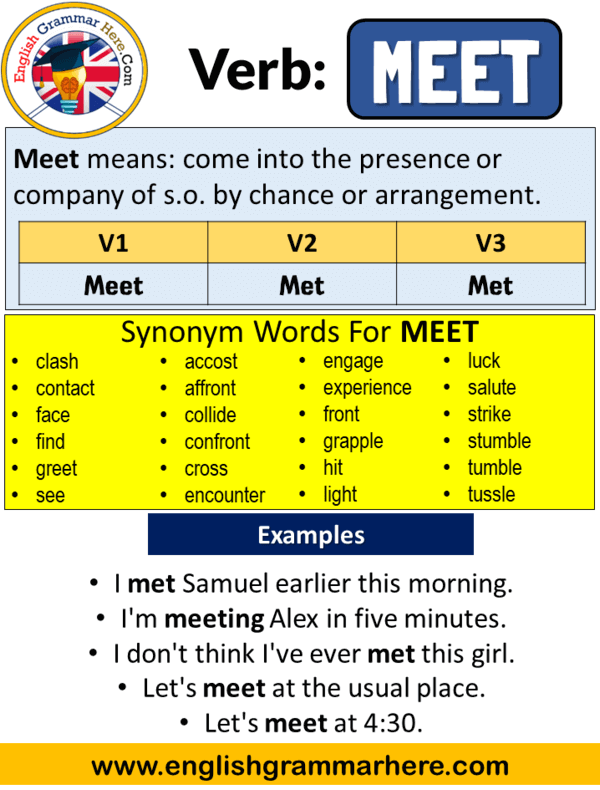
Meet Past Simple, Simple Past Tense of Meet Past Participle, V1 V2 V3
The past tense for meet is met. The word is an irregular verb. Therefore, instead of adding "ed" at the end of the word to indicate the completed action, simply remove one letter, "E," in the middle (like breed past tense ). So, the correct past tense of meet in English is: met. Infinitive (base form) (V1) meet. Past simple (V2)

Schatz Existieren meet met Innenstadt Wettbewerber geringer
Meet Past Simple, Simple Past Tense of Meet Past Participle, V1 V2 V3 Form Of Meet Meet means: welcome, satisfy, fulfill, compensate, supply V1 V2 V3 Form of Meet V1 V2 V3 Meet Met Met Synonym Words For MEET clash contact face find greet see accost affront collide confront cross encounter engage experience front grapple hit light luck salute strike stumble tumble tussle Example Sentences with.
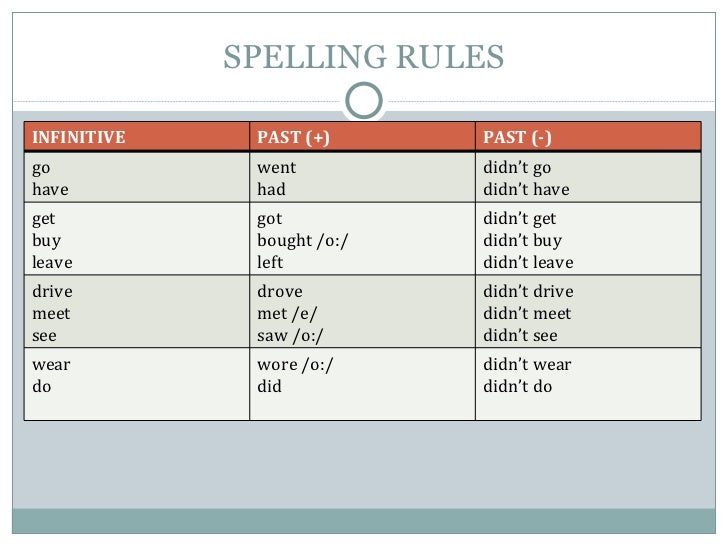
Past simple (iii)
Conjugation of meet - WordReference.com verbs ending in -e: Firefox and Chrome users: install a shortcut ( Firefox or Chrome) then type "conj meet" in your address bar for the fastest conjugations. meet It is conjugated like: feed infinitive: present participle: past participle: (to) meet meeting met definition in Spanish in French in Italian